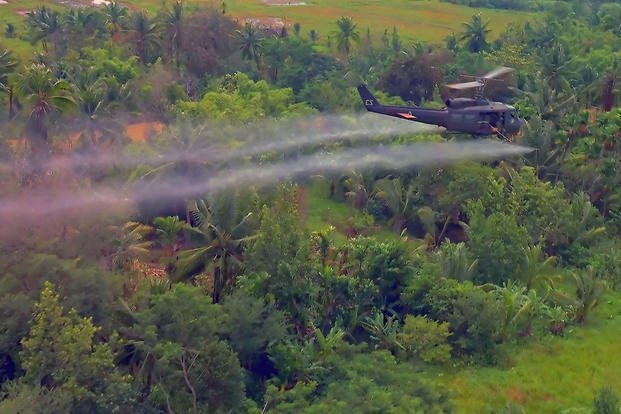In addition to improving access to benefits for post-9/11 veterans exposed to burn pits, the sweeping toxic exposure legislation approved 84-14 by the Senate on Thursday will add two new conditions to the Department of Veterans Affairs' list of Agent Orange-related illnesses and expand benefits for veterans sickened by radiation or poisoned water in certain geographic locations.
The bill adds hypertension and monoclonal gammopathy of undetermined significance, or MGUS, to the list of illnesses linked to Agent Orange exposure, allowing affected veterans to apply for health care and disability benefits with the VA without having to prove that their condition was caused by their service.
The legislation, expected to pass the House next Wednesday and be signed by President Joe Biden, also expands the geographic areas and service dates for eligibility for benefits, including Thailand, Laos, Cambodia, Guam and American Samoa and their territorial waters, and Johnston Atoll or any ship that called on the atoll, on certain dates.
Read Next: 'Forever Chemicals' Linked to Hundreds of Military Bases Are Unsafe at Any Level, EPA Warns
The move follows four years of lobbying by advocacy groups to add hypertension to the list of Agent Orange presumptive conditions, following a National Academies of Sciences, Engineering and Medicine 2018 announcement of proving a link between high blood pressure and the herbicides used during the Vietnam War and elsewhere in Southeast Asia.
Under the new legislation, more than 490,000 Vietnam War veterans may be eligible for disability compensation, at a cost of up to $15 billion of the estimated $278.5 billion Sergeant First Class Heath Robinson Honoring Our Promise to Address Comprehensive Toxics Act.
"The days of ignoring wounds from toxic exposures, wounds not seen until years after, are gone," said Sen. Jon Tester, D-Montana, speaking on the Senate floor before the bill passed Thursday.
"The cost of taking care of our veterans is high, but the truth is, freedom is not free," said Sen. Jerry Moran, R-Kan., also speaking in the Senate on Thursday.
Other senior veterans also may be eligible for expanded benefits as a result of the legislation.
In addition to naming 23 illnesses as presumed to be related to exposure to the burn pits used to dispose of waste in Iraq, Afghanistan and elsewhere, the bill addresses several lesser-known episodes of military exposures responsible for sickening thousands of veterans.
These include service members who cleaned up a nuclear waste site at Enewetak Atoll in the Marshall Islands, as well as nuclear aviation mishap sites in Palomares, Spain, and Thule, Greenland.
The legislation also includes the Camp Lejeune Justice Act, which allows victims of contaminated water -- or their survivors -- at Camp Lejeune, North Carolina, to file lawsuits for illnesses caused by more than 30 years of exposure to chemicals in their drinking water.
The bill expands the geographic region for Persian Gulf War and post-9/11 veterans to include service in Somalia for those who served between 1990 and Sept. 11, 2001, and adds Afghanistan, Djibouti, Egypt, Jordan, Lebanon, Syria, Yemen and Uzbekistan after Sept. 11, 2001.
It also allows veterans who served in a combat zone -- as proven by having an Armed Forces Expeditionary or service-specific Expeditionary Medal, campaign-specific medal or campaign theater award -- and were exposed to burn pits to be eligible for VA health care, phased in between 2024 and 2032, depending on when they served.
It also stipulates that veterans affected by MGUS or hypertension who are older than 85, are terminally ill, homeless or have an extreme financial hardship may apply now, while all others with MGUS may file a claim beginning Oct. 1, and with hypertension, Oct. 1, 2026.
The phase-in was included in the legislation to ensure that the VA health system does not become overwhelmed with the influx of patients. The VA currently provides health care to more than 6 million veterans.
The bill also instructs the VA to review Dependency and Indemnity Compensation claims related to the changes that have been submitted or denied that would have been evaluated differently under the new provisions.
-- Patricia Kime can be reached at Patricia.Kime@Military.com. Follow her on Twitter @patriciakime
Related: Young and Dying: Veterans Are Getting Brain Cancer and Struggling to Get Benefits













